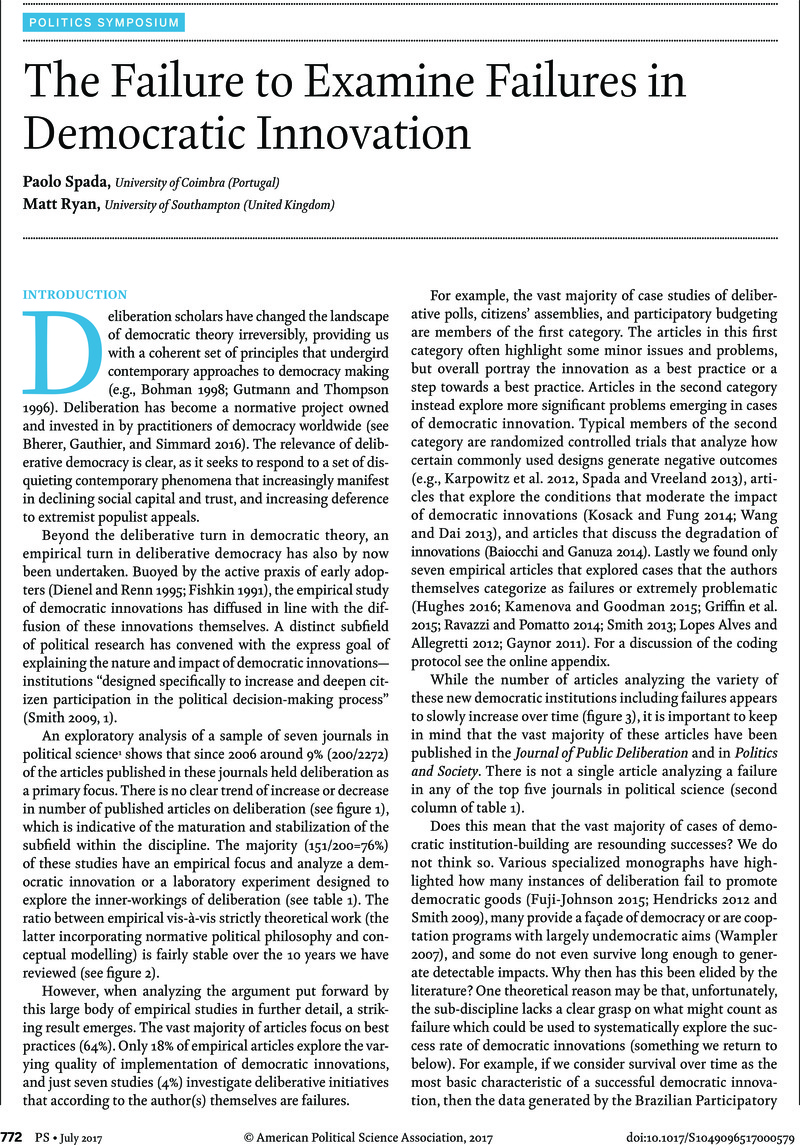Crossref Citations
This article has been cited by the following publications. This list is generated based on data provided by Crossref.
Gastil, John
2018.
The Lessons and Limitations of Experiments in Democratic Deliberation.
Annual Review of Law and Social Science,
Vol. 14,
Issue. 1,
p.
271.
Boulianne, Shelley
2019.
Building Faith in Democracy: Deliberative Events, Political Trust and Efficacy.
Political Studies,
Vol. 67,
Issue. 1,
p.
4.
Bowman, Quinlan
2019.
Studying democratic innovations: toward a problem-driven approach to case study research.
Policy Studies,
Vol. 40,
Issue. 5,
p.
556.
Wuttke, Alexander
2019.
Why Too Many Political Science Findings Cannot Be Trusted and What We Can Do About It: A Review of Meta-Scientific Research and a Call for Academic Reform.
Politische Vierteljahresschrift,
Vol. 60,
Issue. 1,
p.
1.
Richardson, Liz
Durose, Catherine
and
Perry, Beth
2019.
Moving towards hybridity in causal explanation: The example of citizen participation.
Social Policy & Administration,
Vol. 53,
Issue. 2,
p.
265.
Damnjanović, Ivana
2019.
Democratic innovations in Serbia: a misplaced trust in technology.
Contemporary Politics,
Vol. 25,
Issue. 1,
p.
111.
Jäske, Maija
and
Setälä, Maija
2020.
A Functionalist Approach to Democratic Innovations.
Representation,
Vol. 56,
Issue. 4,
p.
467.
Parkinson, John
2020.
The Roles of Referendums in Deliberative Systems.
Representation,
Vol. 56,
Issue. 4,
p.
485.
Soukop, Michal
Šaradín, Pavel
and
Zapletalová, Markéta
2021.
Participatory Budgeting: Case Study of Possible Causes of Failures.
Slovak Journal of Political Sciences,
p.
139.
Felicetti, Andrea
2021.
Learning from Democratic Practices: New Perspectives in Institutional Design.
The Journal of Politics,
Vol. 83,
Issue. 4,
p.
1589.
Rico Motos, Carlos
Font, Joan
Bherer, Laurence
and
Smith, Graham
2021.
Expertise and Participatory Governance: The Incorporation of Expert Knowledge in Local Participatory Processes.
Journal of Deliberative Democracy,
Vol. 17,
Issue. 2,
GALAIS, CAROL
FERNÁNDEZ‐MARTÍNEZ, JOSÉ LUIS
FONT, JOAN
and
SMITH, GRAHAM
2021.
Testing the input‐process‐output model of public participation.
European Journal of Political Research,
Vol. 60,
Issue. 4,
p.
807.
Berg, Janne
Lindholm, Jenny
and
Högväg, Joachim
2021.
How do we know that it works? Designing a digital democratic innovation with the help of user-centered design.
Information Polity,
Vol. 26,
Issue. 3,
p.
221.
Jacquet, Vincent
and
van der Does, Ramon
2021.
Deliberation and Policy-Making: Three Ways to Think About Minipublics’ Consequences.
Administration & Society,
Vol. 53,
Issue. 3,
p.
468.
Boswell, John
2021.
Seeing Like a Citizen: How Being a Participant in a Citizens' Assembly Changed Everything I Thought I Knew about Deliberative Minipublics.
Journal of Deliberative Democracy,
Vol. 17,
Issue. 2,
Veri, Francesco
2022.
Exploring Methodological Challenges in Deliberative Democracy.
Comparative Sociology,
Vol. 21,
Issue. 2,
p.
200.
Vrydagh, Julien
2022.
Measuring the impact of consultative citizen participation: reviewing the congruency approaches for assessing the uptake of citizen ideas.
Policy Sciences,
Vol. 55,
Issue. 1,
p.
65.
Knobloch, Katherine
and
Gastil, John
2022.
How Deliberative Experiences Shape Subjective Outcomes: A Study of Fifteen Minipublics from 2010-2018.
Journal of Deliberative Democracy,
Vol. 18,
Issue. 1,
Vrydagh, Julien
and
Caluwaerts, Didier
2023.
How do Mini-publics Affect Public Policy? Disentangling the Influences of a Mini-public on Public Policy Using the Sequential Impact Matrix Framework.
Representation,
Vol. 59,
Issue. 1,
p.
117.
Font, Joan
and
Rico Motos, Carlos
2023.
Participatory Institutions and Political Ideologies: How and Why They Matter?.
Political Studies Review,





